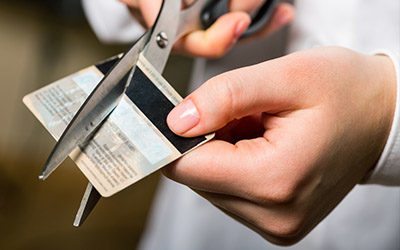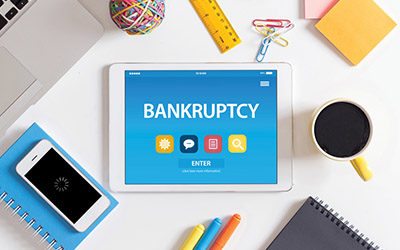Filing for Bankruptcy
Filing for bankruptcy is a major decision, one that may seem complicated when you’re loaded down with debt. Many people know that bankruptcy is an option when they are unable to pay their bills, but they don’t know what they should do. There is a way to get your life and finances back on track and step onto the path to financial freedom.
What you should know about filing for bankruptcy:
–Eliminate credit card bills, medical bills, foreclosure process, wage garnishment and creditor harassment
–Keep you home, your car, your wages and your furniture
-Over one millions Americans file for bankruptcy every year

Check now if you qualify for bankruptcy protection, it’s 100% free
Call it an extreme measure but filing for bankruptcy is used in the right way at the right time. Not only does it help save you money, but it also gives you the much-needed peace of mind. Above anything else, it is your golden ticket to getting back on your feet financially. Just keep in mind, however, that it can be both expensive and time-consuming, let alone have a significant impact on your credit score.

What is Bankruptcy?
Bankruptcy is pretty much a scary proposition. The term itself already sounds so ominous. And it does not really help when the media bombard nightmare stories of seemingly successful business going from the top to the bottom. Still, bankruptcy covers anything from personal to business spectrum.
Interestingly, bankruptcy provides you with the opportunity to get out from any substantial debt while having to treat creditors in a very fair manner. Once the process is complete, the debtor (the person filing for bankruptcy) will experience the so-called “fresh start.” You simply get the chance to start over without the unwanted burden of unpaid bills.
For the most part of it, bankruptcy falls into one of two types – liquidation and reorganization.
Liquidation – In order to qualify for wiping out your debt, you need to agree that the trustee can both take and liquidate (i.e. sell) some of the property in order to pay back the debt. However, you can always keep (i.e. exempt) property as per the state law.
Reorganization – Bankruptcy is also designed to reorganize debt, particularly for high-income earning persons, though it is often made available to others. While you can keep the entirety of your property, you are required to pay the creditors the value involved in any nonexempt assets. This is simply part of a three- to five-year bankruptcy payment plan, including any additional discretionary income based on the bankruptcy rules.
To help you assess your financial danger zone, ask yourself these questions:
Are bill creditors always calling you?
Are you seriously considering debt consolidation?
Do you even have a general idea of how much you owe exactly?
Does the idea of sorting each of your finances somehow make you feel out of control and scared?
Do you mostly use credit cards to pay utilities?
Assessing Your Situation
If your answers are mostly yes, then it is time you give your financial situation a little more thought. Remember: Bankruptcy happens when you owe more than you can afford. That is why most financial gurus advise to never bite more than you can chew. It is bad for you and the business. To determine where you stand financially, make sure to inventory all of your liquid assets. This also includes, but not limited to, bonds, college savings accounts, funds, real estate, stocks, vehicles, and other non-bank account funds. Come up with a rough estimate for each item. From there, start collecting and adding all your credit statements and bills. If you find out that the value of your asset is incredibly less than the debt you owe, then your only way of this sticky financial position is filing for bankruptcy. Just keep in mind that bankruptcy should never ever be approached casually. It is not a cure-all process for resolving the out-of-control debt, so make sure you understand the complexities involved.
Filing for Bankruptcy
For starters, there are two main ways for you to go bankrupt. Of course, the most common route is to simply file for bankruptcy voluntarily. The second one is when creditors ask the court to order you a bankrupt. While there are several ways to file for bankruptcy, each of them comes with pros and cons. So, as much as possible, consult this first with a lawyer before proceeding in order to determine the best course of action to take.
Introducing Chapter 7 Bankruptcy
Apparently, there are more and more people filing for Chapter 7 Bankruptcy. So, whatever your reason is for filing, you are not alone. Still, some of the most common reasons are huge medical expenses, marital issues, overextended credit, and unemployment just to name a few. This type of filing for bankruptcy is often deemed as a “straight bankruptcy.” That is because Chapter 7 simply liquidates all of your assets in order to pay off as much debt as possible. As for the cash acquired from your asset, it is distributed to creditors such as banks and credit card companies.
You are expected to receive a notice of discharge, at least, within 4 months. Still, the record of your bankruptcy will be held on your credit card report, and this will be visible for 10 years. Do not be burdened, though. It is not the end of the world for you. In fact, lots of people who file for Chapter 7 bankruptcy managed to buy homes despite the financial situation they previously had, not to mention the bankruptcy record. Just think of this chapter as your way to starting quick and fresh.
It is worth noting, however, that Chapter 7 Bankruptcy is not applicable to everyone. Almost all assets are taken and sold just to pay creditors. So, if you own a company, a home for your family, or even other items deemed personal assets, it is safe to that this chapter is not always the best option there is.
Introducing Chapter 13 Bankruptcy
Do you have a property like a mansion, and do you want to keep it? If yes, then there is no doubt Chapter 13 Bankruptcy is for you. Also known as reorganization bankruptcy, this one here enables you to pay off your debts over a certain period of time (though, in most cases, it is usually 3 to 5 years). And if you have a record of consistent and predictable yearly income, it is likely for this chapter to provide you with a grace period. Keep in mind that any debts that have remained at the end of the declared grace period are automatically discharged.
Once your Chapter 13 filing for bankruptcy is approved, creditors are required by law to stop contacting you in any form. This gives you the opportunity to continue working and paying off your debts over the next coming years. Above all, while doing all of these you get to keep your precious property and/or possessions. Again, like Chapter 7, this type of bankruptcy does not work for everybody; hence it is best to consult with your lawyer.
Scary But Undeniably Necessary
It holds true that filing for bankruptcy is a scary idea, let alone experience the process involved. It is even hard to admit to yourself that you need help in getting out of debts. As hard and scary as it may sound, you can never do it alone. Otherwise, the government would not be introducing bankruptcy laws whatsoever. These are all designed to protect you, not just the creditors if you have outstanding debts in place.

Frequently Asked Questions
There is really no definite answer, but it is entirely possible for you to acquire a new credit card after filing for bankruptcy. However, it is likely for the offers to be made available only after the discharge, and they are perhaps different from what was offered before. For instance, you might notice that you are now open to higher interest rates and fees, along with more limited lines of credit.
If you are having second thoughts applying for regular credit cards (due to possible turn down), you may go with secured credit cards. These require you to put up a set amount of money to the company in question. Then, this amount will serve as your very own credit limit. As long as you make payments on time, there is no reason for you not to start reestablishing your credit report.
After filing for bankruptcy, there are a lot of things that can happen to your assets. It really depends on which bankruptcy you file. If you file for Chapter 7 bankruptcy, then you are required to list all of your property assets. Chapter 13 bankruptcy, on the other hand, allows you to keep most, if not all, of your property and assets.
It is possible but only unless there are issues that, in one way or another, cannot be resolved among you and the creditors, there is really no need for you to go to court. It is true that you are required to attend at least one meeting, but it will not be held in a courtroom whatsoever. There is no even judge who will preside. Believe it or not, the judge is not allowed to be there in the first place. This meeting also takes place between 20 and 40 days right after the date you filed for bankruptcy. If you have filed under Chapter 13, it is required for you to attend an additional hearing just to confirm your desired payment plan. This is usually about a month after the meeting with the creditors.
Ultimately, it is your credit card company that will have to decide whether or not you can keep your credit card after filing for bankruptcy. If it happens that you still have a balance on the card, there is no doubt your credit card company will cancel your card. And even if your balance zero, the company may resort to terminating your account. Mind you, they can do this without having to seek your approval. Moreover, if you file for bankruptcy and you have a zero balance on one account (say, it is an attempt to keep that card), your other creditors will have something against you. That is they will challenge the legitimacy of your filing. For instance, they will wonder: If you really have enough money to pay at least one debt, then why is it impossible for you to pay the rest? It is no secret why some business owners are easily pushed out of bankruptcy, thanks to this kind of challenge. So, think of it as a blessing in disguise. It is still a great way to eliminate all the debts that you are trying to erase.
Once you have prepared and filed all the necessary paperwork for your bankruptcy, expect each and every creditor of yours to be notified by the court clerk. But this notification is all about letting them know that they can no longer get in touch with you. The notice will include details pertaining to your meeting with creditors. If for whatever reason these creditors still pursue you, even after receiving the said notification, they are automatically subject to sanctions courtesy of the bankruptcy court.
Of course, not. You and your wife not required to file together. However, there is a possibility that you may both want to file jointly, but only if you both of you are responsible for the debt. This means that the both of you have co-signed a debt together. For example, you have bought a car together, so it is only right that both had signed for the car loan.
If you happen to live in a community property state, such as Arizona, California, Idaho, and Louisiana, among others – or, at least, you have opted into community property arrangements in Alaska – you and your wife are responsible (jointly) for debts. And yes, this despite not co-signing for these debts.
Top Bankruptcy Law Firms

Price Law Group
Price Law Group has over 25 years of experience in protecting clients from financial crisis. With offices conveniently located throughout California, Nevada, Arizona, New York, New Jersey, and Kansas Price Law Group makes it simple to serve you.

Upright Law
Upright's leadership team brings decades of experience, cutting edge technology, a creative vision and a passion for changing lives to an industry that’s too often mired in the past.

LegalZoom
LegalZoom can connect you with a bankruptcy attorney who will help you determine which type of bankruptcy is right for you, prepare and file the necessary documents, and advise you throughout the bankruptcy process.

Simon Resnik
Simon Resnik Hayes LLP, works with people and small businesses to find debt relief and mortgage solutions that give them financial breathing room to make a fresh start.
Check now if you qualify for bankruptcy protection, it’s 100% free


